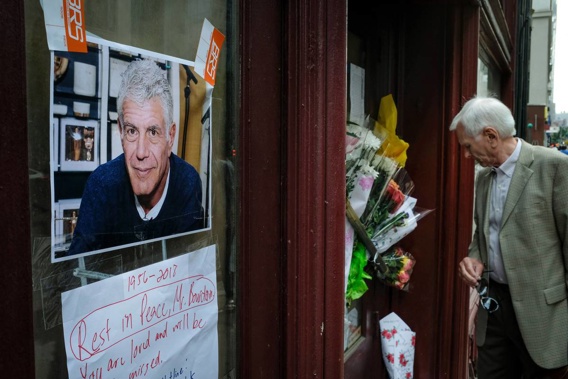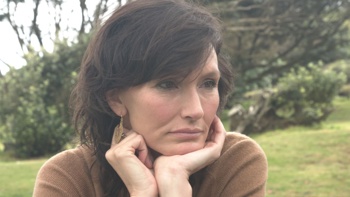
Sigh. Here's my hope. One day, we can listen to people who speak honestly about their distress, suffering and mental illness without feeling obliged to gush over them for being (adopt hushed, bedside manner voice) "sooo brave and sooo courageous".
I was spurred to think about this after the news this week of the suicides of fashion designer Kate Spade (55) and chef and writer Anthony Bourdain (61). I was also moved by the writing of New Zealand entrepreneur Jenene Crossan (40) who acknowledged she had considered suicide and then wrote candidly about what had led her to feeling so desperate.
In a blog post, republished in the NBR, Crossan, who runs the online start-up Flossie, described how she ended up on the bathroom floor.
"The fall from Most Inspirational Person 2016 to the cold, hard wood next to my toilet knocked all the polish off."
Crossan shared the "pure, emotional brutality" of facing her self-loathing and deciding whether she wanted to opt out of all the mess and pain or face the long rebuild ahead. Happily, she chose the latter.
My first reaction on reading her blog was that she was courageous to write publicly about it. And of course she is, especially as part of the often toxic Brotopia culture of tech start-ups.
But I also wondered why do we offer such fulsome praise to someone simply for telling the truth? I remember finding it awkward and confusing when readers praised me four years ago for writing about being depressed. Why did they think I deserved acclaim simply for not lying and pretending I was fine?
/arc-anglerfish-syd-prod-nzme.s3.amazonaws.com/public/K7RAZRQJMVG4NDTLXWNX2G74EY.jpg)
New York fashion designer Kate Spade. Photo / AP
On the face of it this seems positive, but it also functions as tacit acknowledgement that being mentally ill is such an appalling prospect you need to be congratulated for facing it. You don't tend to praise people for their bravery in sharing they caught pneumonia or broke their leg.
The praise shows the stigma of mental illness is very much alive and well. It may even perpetuate it. Although I am sure one day it will abate. For example, these days (I hope) you would be unlikely to say someone was "brave" for telling you they are gay. And in my view, if you spill your guts about the truth of your life it is just as likely to show you are deeply human, as that you are deeply ill.
Which is not to say personal suffering, despite being more common than we might think, is not serious.
A US report found 54 per cent of suicides occurred in the absence of a known mental health condition. Not everyone who contemplates suicide is mentally ill in a diagnostic sense. But it's not binary, because they're certainly not mentally healthy either. And it's important – life-saving even – that they can talk about the truth of their lives.
It's not just me saying that. New research, published last month, identified "self-concealment" and "perfectionistic self-presentation" as linked to greater levels of psychache (psychological pain) and predictive of suicidal ideation. It's officially life-threatening to bottle it up.
The findings are robust. It is clear that people who mask or conceal their psychological distress are particularly at risk of taking their own lives. It's something Crossan has certainly experienced. In the dog-eat-dog world of tech start-ups it is not permitted to show any chink in your armour, let alone existential agony. "I was coached by my first investor at the age of 22 to never let weakness show. Vulnerability is for pussies. People buy positivity," Crossan writes.
The researchers behind the perfectionism study say their findings underscore the importance of identifying people who are high on self-concealment and perfectionistic self-preservation as part of the campaign to bring down suicide rates. Another study, from the UK found "socially prescribed perfectionism" – hello Facebook - was particularly dangerous.
/arc-anglerfish-syd-prod-nzme.s3.amazonaws.com/public/K2A22H5NP5CWRGMVEGP4YPQ3K4.jpg)
Chef and writer Anthony Bourdain. Photo / File
I understood what Crossan meant when she said "pushing boundaries creates isolation and lack of perspective". It's the isolation that is the killer. I think being told you're so brave for sharing your feelings is helpful if it means you feel connected and supported. But when it is a sort of mawkish rubbernecking at your emotional risk-taking – "You really put yourself out there, don't you?" as one person said to me – it can make you feel doubly stigmatised.
One day I believe societal norms will change and we will be able to accept that feeling desperate and despairing sometimes does not make you a freakish sick person. It simply makes you real.
Where to get help:
If you are worried about your or someone else's mental health, the best place to get help is your GP or local mental health provider. However, if you or someone else is in danger or endangering others, call police immediately on 111.
Need to talk? Free call or text 1737 any time for support from a trained counsellor.
Or if you need to talk to someone else:
Lifeline – 0800 543 354
Suicide Crisis Helpline – 0508 828 865 (0508 TAUTOKO)
Youthline – 0800 376 633 or free text 234
Kidsline – 0800 54 37 54 (for under 18s)
What's Up – 0800 942 8787 (for 5–18 year olds 1pm–10pm weekdays and 3pm–10pm weekends)
Depression Helpline – 0800 111 757 or free text 4202
Samaritans – 0800 726 666
OUTLine NZ – 0800 688 5463
Healthline – 0800 611 116
Take your Radio, Podcasts and Music with you









